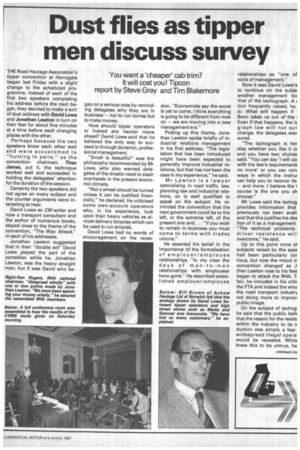Dust flies as tipper men discuss survey
Page 33

If you've noticed an error in this article please click here to report it so we can fix it.
You want a 'cheaper' cab trim? It will cost you! Tipcon report by Steve Gray and Tim Blakemore
THE Road Haulage Association's tipper convention at Harrogate began last Friday with a slight change to the scheduled programme. Instead of each of the first two speakers completing his address before the next began, they decided to make a sort of dual address with David Lowe and Jonathan Lawton in turn on their feet for about five minutes at a time before each changing places with the other.
Perhaps because the two speakers know each other well and were accustomed to "hunting in pairs," as the convention chairman, Theo James, put it, the technique worked well and succeeded in holding the delegates' attention for the duration of the session.
Certainly the two speakers did not agree on every subject and the counter arguments were interesting to hear.
David Lowe ex CM writer and now a transport consultant and the author of numerous books, stayed close to the theme of the convention, "The Way Ahead," in each of his addresses.
Jonathan Lawton suggested that in their "double act" David Lowe played the part of the comedian while he, Jonathan Lawton, was the heavy straight man, but it was David who be gen on a serious note by reminding delegates why they are in business — not to run lorries but to make money.
How should tipper operators or indeed any haulier move ahead? David Lowe said that he believed the only way to succeed is through dynamic, professional management.
"Small is beautiful" was the philosophy recommended by Mr Lowe, who also warned delegates of the drastic need to slash overheads in the present economic climate.
"Not a wheel should be turned unless it can be justified financially," he declared. He criticised some own-account operators who, in his experience, look upon their heavy vehicles as almost delivery bicycles which can be used to run errands.
David Lowe had no words of encouragement on the reces
sion. "Economists say the worst is yet to come. I think everything is going to be different from now on — we are moving into a new management era."
Picking up this theme, Jonathan Lawton spoke briefly of industrial relations management in his first address. "The legislation that has been introduced might have been expected to generally improve industrial relations, but that has not been the case in my experience," he said.
Mr Lawton is a lawyer specialising in road traffic law, planning law and industrial relations, so is well qualified to speak on the subject. He reminded the convention that the next government could be to the left, or the extreme left, of the present one and ... "if you wish to remain in business you must come to terms with trades unions."
He asserted his belief in the importance of the formalisation of employer/employee relationships. "In my view the days of man-to-man relationships with employees have gone." He described established employer/employee relationships as "one of tools of management."
Now it was David Lowe's to continue on the subjel another management toc that of the tachograph. A r tion frequently raised, he is: What will happen if Benn takes us out of the I Even if that happens, the ts graph law will not qui change, the delegates wen sured.
"The tachograph is her stay whether you like it oi and you have two choice! said. "You can say 'I will col with the law's requirements no more' or you can con: ways in which the instrur can help you to recover its — and more. I believe the I course is the one you sh choose."
Mr Lowe said the tachog provides information that previously not been avail, and that this justifies his des tion of it as a management "The technical problems driver resistance will overcome," he said.
Up to this point none al subjects raised by the spec had been particularly cor tious, but now the mood co convention changed as J than Lawton rose to his feet began to attack the RHA. fair, he included in his cribs the FTA and indeed the who the road transport industry not doing more to improvi public image.
On the subject of tachogi he said that the public bell( that the reason for the resist within the industry to its it duction was simply a fear widespread illegal opera• would be revealed. While knew this to be untrue, he












































































































